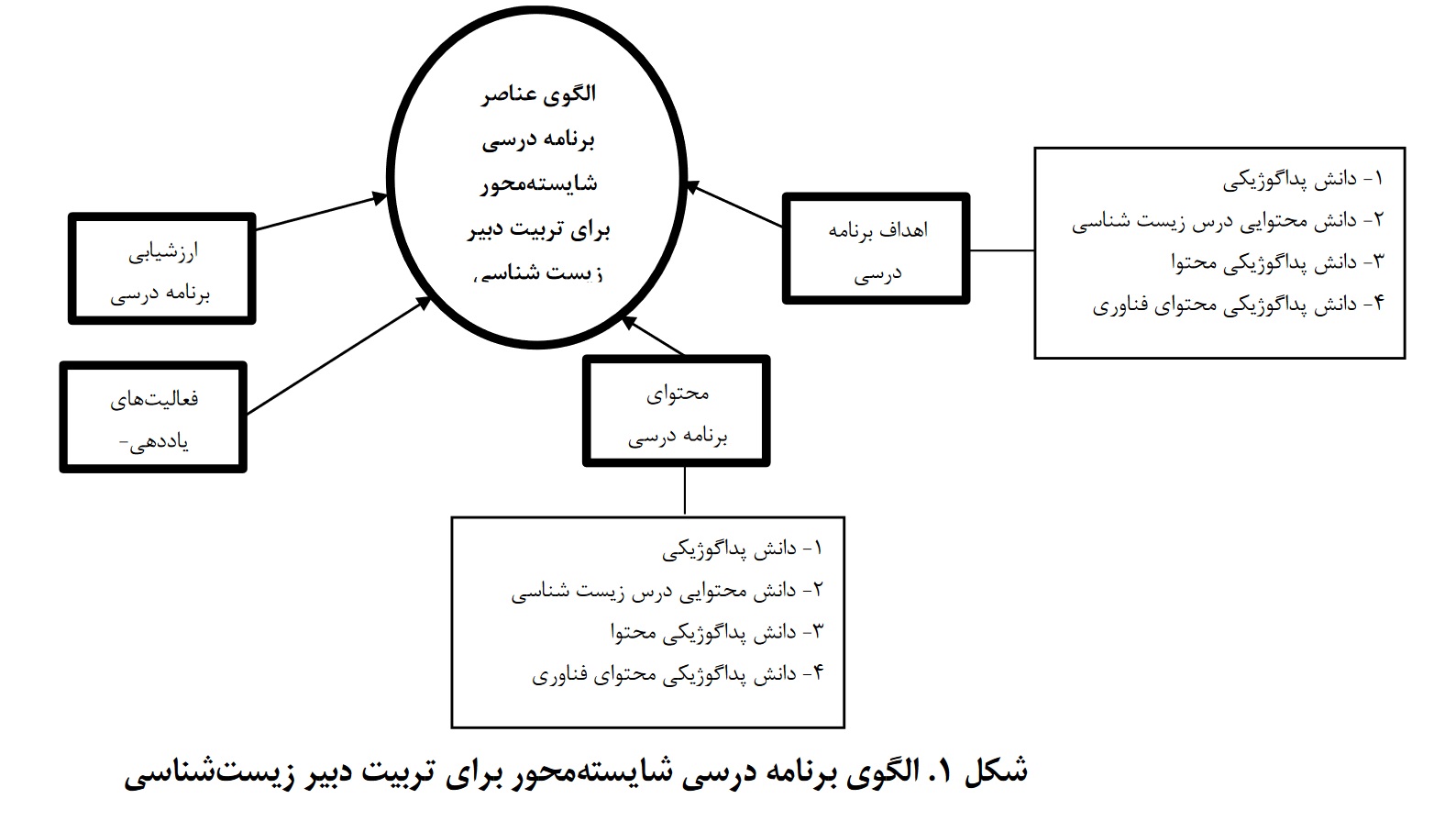Development and Validation of a Competency-Based Curriculum Model for Biology Teacher Education
Keywords:
Curriculum elements, competency-based, teacher education, biologyAbstract
The aim of the present article was to develop and validate a competency-based curriculum model for the education of biology teachers. The research method was a mixed approach, including both qualitative and quantitative phases. The statistical population in the qualitative phase included university instructors, school teachers, and exam preparation centers' educators in the city of Tabriz during the 2020-2021 academic year. In the quantitative phase, the population included biology instructors from universities in East Azerbaijan Province, school teachers, and exam preparation centers' educators in Tabriz during the 2021-2022 academic year. The sample size in the qualitative phase consisted of 15 individuals selected using the snowball sampling method until theoretical saturation was reached, while in the quantitative phase, 150 individuals were selected using a stratified proportional random sampling method. Data collection in the qualitative phase was conducted through semi-structured interviews, and in the quantitative phase, through a researcher-made questionnaire. To assess the validity of the qualitative phase's questionnaire, internal validity was used, and for reliability, test-retest reliability was employed. For the quantitative phase's questionnaire, content and construct validity were assessed, and Cronbach's alpha was used to measure reliability. Qualitative data were analyzed using "thematic analysis," while quantitative data were analyzed using "exploratory factor analysis." In the qualitative phase, out of the initial 310 codes, 44 categorized codes, 10 sub-themes, and 4 main themes related to competency-based curriculum elements—including objectives, content, teaching-learning activities, and evaluation—were identified, and the proposed model was designed. In the quantitative phase, construct validity and factor loadings of the identified components were performed using exploratory factor analysis, and ultimately, the competency-based curriculum model for biology teacher education was validated and confirmed. Therefore, the localized tool is applicable for the education of biology teachers.
Downloads
References
Nasr Isfahani AR, Khoroushi P, Mousapour N, Shah Jafari SE. The teacher-centered approach based on transformation
documents in Iran. Culture Strategy. 2017;37.
Taqieh NK, Liyaqdar MJ, Zaman BE. Examining the professional competencies of life skills teachers at the secondary
level based on the student evaluation approach. Journal of Educational Strategies in Medical Sciences. 2021;14(6):430-21.
Fullan MG. Why Teachers Must Become Change Agents. The Professional Teacher. 1993(8):12-7.
Aftabi P, Asgari MA, Ghaedari M. Designing a model of teachers' content, pedagogical, and technological knowledge
for science teachers in the first grade of secondary education in Kurdistan Province. Journal of Scientific Publications
Management, University of Kurdistan. 2019;7(2):188-61.
Kramer M, Fortsch C, Boone WJ, Seidel T, Neuhaus BJ. Investigating Pre-Service Biology Teachers' Diagnostic
Competences: Relationships between Professional Knowledge, Diagnostic Activities, and Diagnostic Accuracy. Education
Science. 2021;11(89):1-23. doi: 10.3390/educsci11030089. https://doi.org/10.3390/educsci11030089
Shulman LS. Knowledge and teaching: foundations of the new reform. Harvard Educational Review. 1987;57(1):1-
doi: 10.17763/haer.57.1.j463w79r56455411. https://doi.org/10.17763/haer.57.1.j463w79r56455411
Bolokat MR, Sharifi SM, Afkaneh M. Identifying the competencies of automotive industry managers (case study:
Islamic Republic News Agencies). Journal of Iranian Public Management Studies. 2020;3(2):130-09.
Shulman LS. Those who understand: Knowledge growth in teaching. Educational Research. 1986;15(3):4-14. doi:
2307/1175860
3102/0013189X015002004. https://doi.org/10.2307/1175860
3102/0013189X015002004
Shulman LS. Reconnecting foundations to the substance of teacher education. Teachers College Record.
;91(3):300-10. doi: 10.1177/016146819009100311. https://doi.org/10.1177/016146819009100311
Gonczi A. Conceptualizing Competency-based Education and Training: with particular reference to education for
occupations in Australia: University of Technology, Sidney; 1996.
Mishra P, Koehler MJ. Technological Pedagogical Content Knowledge: A new framework for teacher knowledge.
Teachers College Record. 2006;108(6):1017-54. doi: 10.1177/016146810610800610.
https://doi.org/10.1177/016146810610800610
Doering A, Scharber C, Miller C, Veletsianos G, editors. GeoThentic: Designing and Assessing with Technological
Pedagogical Content Knowledge. Proceedings of Society for Information Technology and Teacher Education International
Conference 2009; 2009; Chesapeake, VA: AACE.

Downloads
Published
Submitted
Revised
Accepted
Issue
Section
License
Copyright (c) 2024 Journal of Study and Innovation in Education and Development

This work is licensed under a Creative Commons Attribution-NonCommercial 4.0 International License.










